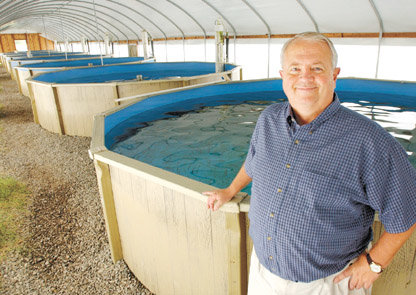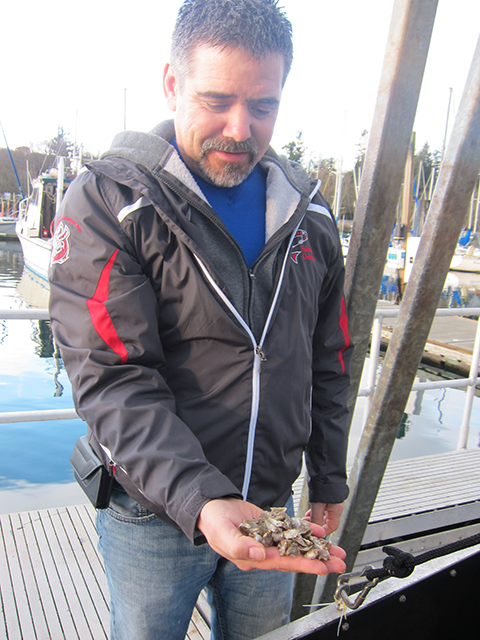As the aquaculture industry mourns the loss of two dedicated and visionary leaders, the Northwest Aquaculture Alliance has vowed to keep their legacies alive

The aquaculture industry mourns the loss of Dan Swecker and Kurt Grinnell, two dedicated and visionary leaders who made significant contributions to the aquaculture field during their respective careers. Both served on the Northwest Aquaculture Alliance (NWAA), and the organization has vowed to keep their legacies alive through renewed efforts to advocate for the sector in Washington state.
‘The foster-father of our industry’
On September 1, 2021, fish farming pioneer and aquaculture advocate, Dan Swecker, passed away following a brief illness. Swecker, a former helicopter pilot and Purple Heart and Bronze Star winner, began his fish farming career in 1973 when he and his wife Debby started growing pan-sized coho salmon (Oncorhynchus kisutch) in tanks at their Rochester, Wash., farm.
“[It] was a very impressive operation, given the level of development in the aquaculture industry at that time,” recalled John Forster, Ph.D., industry consultant and former president of Stolt Sea Farm Washington, who visited the Swecker Salmon Farm to learn more about fish farming in the early days of the industry.
Swecker also served as executive director of the Washington Fish Growers Association (WFGA), an organization he helped launch to promote fish farming in the state. During his tenure, he sought to eliminate bureaucratic processes that burdened fish farmers and tackled tough challenges, such as HB 2957, a bill that banned net pen farming of non-native species in state waters. Engaging top fisheries scientists within academia and government, WFGA mounted a robust public affairs campaign to “educate” lawmakers on the matter.
“Dan Swecker viewed aquaculture as both a job creator and as a way to produce local seafood that people could afford, and tirelessly fought to streamline the permitting process,” noted former WFGA lobbyist, Jim Zimmerman. “In his 26-year tenure at WFGA, Dan advocated for streamlined permitting for both freshwater and marine aquaculture, as well as a more rational approach to governance of an industry that was expanding in other countries but lagging in the United States.”
From 1993 to 2013, Swecker also served the Washington State Senate, where he was vice-chair of the Agriculture and Environment Committee and participated on the Natural Resources and Parks and Ways and Means Committees. In his dual roles, Swecker gained a name as an “unflappable” diplomat who worked collaboratively on wide-ranging initiatives, which included everything from streamlining the permitting process for fish farming to changing outdated regulations riddled with red tape.
“We always referred to Dan Swecker as the ‘foster-father of our industry’ because of his tireless efforts in the state legislature to help this fledgling industry grow and succeed,” said Kevin Bright, former WFGA board member and Permit Coordinator for Cooke Aquaculture Pacific. Bright is currently a member of the NWAA Board of Directors.
After retiring in January 2019, Swecker continued to advocate for the aquaculture industry as a senior advisor to WFGA’s successor organization, the newly formed NWAA. His more than 26 years of advocacy earned him the NWAA’s Lifetime Achievement Award in December 2019. Jeanne McKnight, NWAA Executive Director, credited Wally Stevens for giving NWAA the idea of making the award.
“I reached out to Wally Stevens to get his views on the best way to honor Dan Swecker,” she said. ”He suggested we consider creating a Lifetime Achievement Award to pay tribute to people whose contributions to aquaculture in the region might otherwise have gone unnoticed.”
McKnight said that Swecker’s past service made him a perfect fit: “Having spent years and hundreds of thousands of dollars trying to get permits to put in net pens in Puget Sound, Dan understood the frustrations of the fish farmer, and he knew how to navigate the often-rough political waters. For these efforts and many more, the NWAA Board honored this fearless leader.”
An ‘immeasurable’ impact
Swecker’s death comes on the heels of another major loss for the aquaculture industry in Kurt Grinnell, who died as the result of a car crash on April 20, 2021. A Jamestown S’Klallam Tribal Council member, Grinnell helped build Jamestown Seafood, which is jointly owned by the tribe, into a profitable business with more than 50 employees. Today, Jamestown Seafood is a leading producer of oysters and oyster seed.
Grinnell grew up in a fishing family and worked in the 1990s as a geoduck diver for the Tribe. He became interested in oyster aquaculture, working with the Tribe’s Natural Resources staff to seed Sequim Bay, but soon discovered that there was a shortage of oyster seed. He spent the next ten years partnering with local experts and growing the Tribe’s hatchery operations to include satellites in Kona, Hawaii, as well as Brinnon and Sequim, Wash. Today, they provide seed to oyster and geoduck farms throughout the northwest.

“It was Kurt’s bold dream to bring marine aquaculture to Port Angeles, the Olympic Peninsula, and to the traditional seafood grounds of the Jamestown S’Klallam Tribe,” Jim Parsons, president of the NWAA. “Kurt strongly believed in the vision of a vibrant Blue Economy in Washington State, one that would provide a living wage for people in rural areas where jobs are scarce.”
Parsons credited Grinnell with reaching out to other Northwest Tribes to encourage them to see aquaculture as a key strategy for food sovereignty and security, given the decline in traditional seafoods, such as wild salmon. While not everyone from other tribes agreed with Grinnell on aquaculture issues, “There was not a human on this planet who did not love Kurt,” noted Betty Oppenheimer, Communications Specialist for the Jamestown S’Klallam Tribe.
Under his tenure, he led the Tribe’s partnership with Cooke Aquaculture Pacific to produce native species in Puget Sound waters off Port Angeles, Wash. Jamestown S’Klallam Tribe Chairman and CEO, W. Ron Allen, said that Grinnell’s impact on the community was “immeasurable.”
“Our Council is committed to pursuing our self-reliance goal through diversified economic development and education, and we believe this partnership with Cooke Aquaculture Pacific will contribute to meeting that goal,” he said. “We, along with our sister tribes, are strong stewards of our environment. And we firmly believe we can implement net pen aquaculture consistent with our tribal heritage and cultural values. By working together, combining our history and experience fishing on the Olympic Peninsula with Cooke’s experience and expertise in aquaculture, we are confident that we can raise a sustainable supply of (rainbow) trout…and contribute to our local economy.”
In April 2019, Grinnell joined the board of directors of the NWAA and was elected vice president in early 2020. At the heart of his lifework was the belief that feeding his community would help the tribe thrive, often expressing that “to truly be a sovereign nation, we as a people need food sovereignty.”
“Kurt embodied the belief of his culture that it is important to plan seven generations ahead,” Parsons said. “He understood that the culture of finfish, shellfish, and aquatic plants was an important solution to the decline in the harvest of traditional wild species, and a way for Pacific Northwest Tribes to harvest seafood in their usual and accustomed areas as guaranteed under Federal Treaties.”
To commemorate Grinnell’s legacy, the NWAA and the National Aquaculture Association (NAA) recently announced the formation of the Kurt Grinnell Aquaculture Scholarship Foundation. It will provide financial assistance for any enrolled member of a United States-recognized Tribe who is pursuing or seeks to pursue studies in aquaculture or aquaculture technology. The scholarship may be used at any recognized university, community college, technical college, trade school, or other recognized institution or program.
“His ‘heart of gold’ spirit provided an amazing stabilizing environment for all who worked with him protecting the Tribe’s Treaty rights and our natural resource program,” said Allen. “Kurt cared about all programs, but education and the support system for the Tribal youth was very special within his vision.”
Follow the Advocate on Twitter @GAA_Advocate
Author
-

Lisa Jackson
Associate Editor Lisa Jackson lives in Hamilton, Ontario, Canada. Her work has been featured in Al Jazeera News, The Globe & Mail, The Independent, and The Toronto Star.
Tagged With
Related Posts

Intelligence
Donald Lightner, influential figure in shrimp aquaculture, remembered
Donald Lightner, pre-eminent shrimp pathology researcher and longtime head of the University of Arizona Aquaculture Pathology Laboratory, has died.

Responsibility
Switch to steelhead has Cooke on a new path in Puget Sound
Cooke Aquaculture Pacific is awaiting approval to farm a species native to Washington at Puget Sound sites where it previously produced Atlantic salmon.

Responsibility
In Canada, salmon farmers building social license with First Nations
After some rocky times, ties between B.C. salmon farmers and First Nations, have improved in recent years. Band members report consistent employment, royalties and improved quality of life. “We need aquaculture around,” says one fishing company owner.

Responsibility
For Great Lakes aquaculture, it’s a tale of two countries
Canada and the United States may be friendly neighbors, but when it comes to aquaculture, the bordering countries take vastly different approaches to aquaculture in the Great Lakes.

